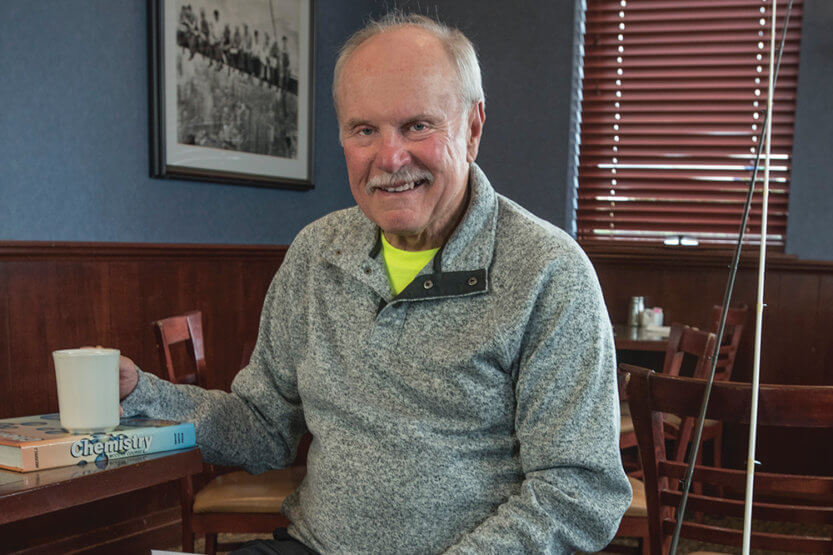Alumni Interview: Ronald S. Urick
 “Students have hearts and souls, and if you show them you care, you can set the bar as high as you want, and they will rise up to meet it,” says Ronald S. Urick, ’71 ED, EDM ’78, whose career started with practice-teaching at University Laboratory High School. (Image by Lloyd DeGrane)
“Students have hearts and souls, and if you show them you care, you can set the bar as high as you want, and they will rise up to meet it,” says Ronald S. Urick, ’71 ED, EDM ’78, whose career started with practice-teaching at University Laboratory High School. (Image by Lloyd DeGrane) In the 1995 movie Mr. Holland’s Opus, Richard Dreyfuss plays a classical composer who begrudgingly accepts a high school music teaching job to pay the bills. As the film unfolds, though, his outlook transforms, and he begins to connect with his students.
Like Mr. Holland, I entered the field of education somewhat blindly. When I transferred to the U of I from Morton Junior College in 1968, I was a mechanical engineering major. But sitting at a drafting board all day with little human contact left me feeling restless and unfulfilled. Flipping through the Illini course catalog, I asked myself, “What the heck can I do without starting over at square one?” Education jumped out. Still, it was essentially a dart throw.
I immediately felt at home in the College of Education, especially while I was practice-teaching at University Laboratory High School, which was largely populated by U of I professors’ children. My chemistry labs were fun and hands-on. I was thrilled to watch students get their hands dirty, use their critical thinking skills and experience the satisfaction of collecting data before arriving at a conclusion. I also realized that my dry sense of humor made kids laugh, which helped cultivate trust.
A posted job notice led me to a 33-year stint teaching physical sciences at Adlai E. Stevenson High School in Lincolnshire (Ill.), followed by a decade at Chicagoland Jewish High School.
But my most revolutionary year as a teacher was 1972 at Stevenson, when administrators asked me to help spearhead Freshman Studies, a new interdisciplinary program. Alongside nine fellow teachers (two each from science, math, English, social science and physical education), we taught courses that transcended the traditional “reading, writing, arithmetic” curriculum, with classes called “Love” and “The Self,” the latter of which centered on self-awareness.
This radical experiment in teaching introduced me to the concept of affect in education—tapping into values and emotions when teaching; talking with your students and not at them; finding ways to connect on a personal level. Students have hearts and souls, and if you can become their ally and show them you care, you can set the bar as high as you want, and they will rise up to meet it.
Students have hearts and souls, and if you can become their ally and show them you care, you can set the bar as high as you want, and they will rise up to meet it.
Those profound lessons shaped the way I taught for the next five decades. I kicked off every school year by spraying my paper-covered whiteboard with an ammonia solution, revealing a hidden “Welcome to Mr. U’s Chemistry Class!” message in vibrant fuchsia (written before class using phenolphthalein, a colorless organic compound that turns pink when mixed with a base).
I ate lunch with students—asking about their personal interests and committing the answers to memory. As a competitive bass fisherman, I used fishing to connect with my kids, offering a guided fishing trip to my top chemistry students every year—one of the school’s most coveted awards. I cheered my athletes on from the stands and sponsored the school ski club. Kids with chaotic home lives were always welcome to stay after school for a few extra hours of calm.
In 2021, I published Teaching with Heart: Inspired Teaching—Stories, Pathways, and Strategies by a Five Decade Teacher and His Former Students. It’s my own take on education along with essays written by 34 of my former students, representing classes from the 1970s through the 2010s.
The result: reflections from a dentist, real estate attorney, Olympic-level strength training coach, NBA draftee, rabbi, trucker, children’s yoga and mindfulness instructor, and more. Eight of my co-authors went on to become teachers themselves; five of them became Illini.
Mr. Holland’s Opus ends with hundreds of former students surprising the retiring teacher by performing a symphony he spent decades writing. In May of 2022, my co-authors joined me for a similar, albeit more scaled-down, celebration of our time together. It was one of the highlights of my life. Having been able to teach them—to teach thousands of students—with heart…that is my opus.

